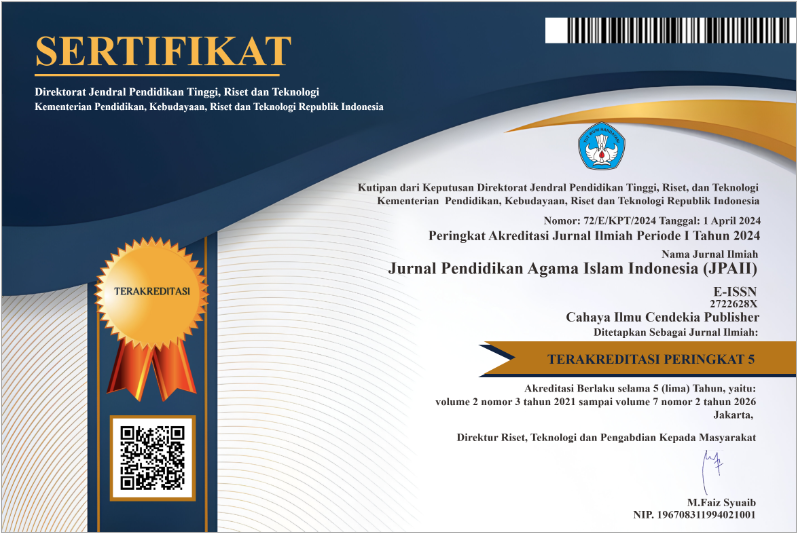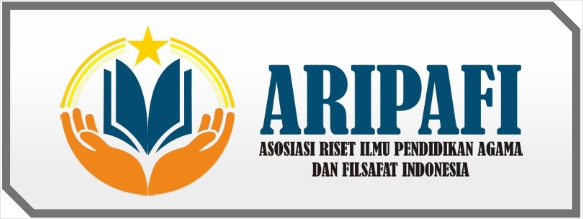Character Education in Islamic Education at Madrasah School Level
Abstract
Purpose of the study: Character education is an essential part of school work, but so far it has received little attention. Schools should not only be obliged to increase academic achievement, but also be responsible for shaping the character of students.
Methodology: This research uses the literature study method which relies on bibliographic sources from books and articles in scientific journals related to the subject matter, reading data with the thoughts of experts with a constructive approach and interpretation of the main content.
Main Findings: Character is developed through the knowledge stage, leading to habituation. Where character is not only based on knowledge, someone who has knowledge about goodness is not necessarily able to act according to his knowledge. So if you are trained to do good, character is not limited to knowledge, character goes deeper into the realm of emotions and personal habits. The Qur'an as a moral reference. Where the Al-Qur'an functions to convey a guiding treatise for organizing attitudes and behavior that must be carried out by humans and where the character education model based on the Al-Qur'an which has been explained in the previous chapter needs to be reviewed, understood and synchronized so that it is easier to understand in learning at school madrasah level
Novelty/Originality of this study: The originality of this research lies in its focus on exploring the potential of character education in Islamic education and its significance in the current context. Although there are many studies on character education and Islamic education separately, research that systematically explores the integration of these two fields in a contemporary context is very limited.
References
S. Bahri, “Father ’ S Role And Character Education : A Reflective Analysis Of The Qur ’ Anic StorieS,” J. Ilm. Islam Futur., vol. 24, no. 1, pp. 102–128, 2024.
D. Saharuddin, Q. Muhammadi, M. Rahmatan, and L. Alamin, “The Role Of Islamic Da ’ Wah And The Implementation Of Sharia On The Existence Of Muslims In The Maldives,” J. Ilm. Islam Futur., vol. 24, no. 1, pp. 85–101, 2024.
C. Mahfud, I. Rohani, Z. Nuryana, Baihaqi, and Munawir, “Islamic education for disabilities: new model for developing Islamic parenting in Integrated Blind Orphanage of Aisyiyah,” Indones. J. Islam Muslim Soc., vol. 13, no. 1, pp. 115–142, 2023, doi: 10.18326/ijims.v13i1.115-142.
S. A. Hakim, “Islamic literature in modern Indonesia: political disputes among Muslim writers, 1930s-1960s,” Indones. J. Islam Muslim Soc., vol. 13, no. 1, pp. 143–167, 2023, doi: 10.18326/ijims.v13i1.143-167.
A. Muttaqin, U. Hamsah, and R. H. Abror, “Muhammadiyah, Sufism, and the quest for ‘authentic’ Islamic spirituality,” Indones. J. Islam Muslim Soc., vol. 13, no. 1, pp. 199–226, 2023, doi: 10.18326/ijims.v13i1.199-226.
Iskandar, Waridin, and D. D. Iskandar, “The potential of Muslim Friendly Hospitality in the tourism industry in Central Java,” Indones. J. Islam Muslim Soc., vol. 13, no. 1, pp. 169–197, 2023, doi: 10.18326/ijims.v13i1.169-197.
M. Taufik, “Strategic role of Islamic religious education in strengthening character education in the era of industrial revolution 4.0,” J. Ilm. Islam Futur., vol. 20, no. 1, p. J. Ilm. Islam Futur., 2020.
I. Warsah, “Jihad and radicalism: Epistemology of Islamic education at Pesantren Al-furqan in Musi rawas district,” J. Ilm. Islam Futur., vol. 21, no. 2, pp. 152–169, 2021.
M. N. Kohar and A. Majid, “The Role of Islamic Religious Education Teachers in Spreading the Ideology of Islamic Moderation,” J. Soc. Res., vol. 2, no. 12, pp. 5012–5021, 2023, doi: 10.55324/josr.v2i12.1604.
Subaidi, “Strengthening Character Education in Indonesia: Implementing Values from Moderate Islam and the Pancasila,” J. Soc. Stud. Educ. Res. SosyalBilgilerEğitimiAraştırmalarıDergisi, vol. 11, no. 2, pp. 120–132, 2020.
N. Taja, E. S. Nurdin, A. Kosasih, E. Suresman, and T. Supriyadi, “Character education in the pandemic era: A religious ethical learning model through Islamic education,” Int. J. Learn. Teach. Educ. Res., vol. 20, no. 11, pp. 132–153, 2021.
M. R. Muzakkir, S. S. Muwahidah, R. Utsany, and Rohmansyah, “Sectarian tensions, Islamophobia, and decolonization: comparing Jasser Auda’s and Jonathan Brown’s analysis of the Hadiths concerning Aisha’s marital age,” Indones. J. Islam Muslim Soc., vol. 13, no. 2, pp. 427–456, 2023, doi: 10.18326/IJIMS.V13I2.427-456.
S. M. Shaharudin, N. A. Rajak, N. W. M. Junus, and N. A. Samat, “Development and validation of early childhood care and education pre-service lecturer instrument,” Int. J. Eval. Res. Educ., vol. 9, no. 1, pp. 188–194, 2020, doi: 10.11591/ijere.v9i1.20415.
R. Tabroni and Idham, “From radical labels to moderate Islam: the transformation of the Salafism movement in Indonesia,” Indones. J. Islam Muslim Soc., vol. 13, no. 2, pp. 279–306, 2023, doi: 10.18326/IJIMS.V13I2.279-306.
M. H. Basya, “Cultural Capital, Islamism, and Political Distrust in Pemilu 2019: An Ethnicity-based Community Engaged in Islamic Defenders Front (FPI),” Indones. J. Islam Muslim Soc., vol. 13, no. 2, pp. 253–278, 2023, doi: 10.18326/ijims.v13i2.253-278.
Lukman et al., “Effective teachers’ personality in strengthening character education,” Int. J. Eval. Res. Educ., vol. 10, no. 2, pp. 512–521, 2021, doi: 10.11591/ijere.v10i2.21629.
M. J. Susilo, M. H. Dewantoro, and Y. Yuningsih, “Character education trend in Indonesia,” J. Educ. Learn., vol. 16, no. 2, pp. 180–188, 2022, doi: 10.11591/edulearn.v16i2.20411.
A. Ubaedillah, “THE MINORITY AND THE STATE: Chinese Muslims in the Modern History of Indonesia,” Al-Jami’ah J. Islam. Stud., vol. 61, no. 1, pp. 107–136, 2023, doi: 10.14421/ajis.2023.611.107-136.
J. Mousavi Dalini and A. Yousefi, “Exploring Push-Pull Factors Affecting Iranian Jews’ Emigration to Palestine, 1925-1954: A Social History Approach,” Al-Jami’ah J. Islam. Stud., vol. 61, no. 1, pp. 181–208, 2024, doi: 10.14421/ajis.2023.611.181-208.
H. Bachtiar, “Muslim Intellectuals Insights and Their Contribution to the Development of Alternative Social Science in the Malay-Indonesian Context,” Teosof. J. Tasawuf dan Pemikir. Islam, vol. 12, no. 2, pp. 307–330, 2022.
M. Zamzami, F. Mahzumi, and A. A’la, “Tarekat and Politics in Indonesia: Contested Authority Between Murshids in the Tarekat Qadiriyah Wa Naqsyabandiyah in East Java During the New Order Era,” Teosof. J. Tasawuf dan Pemikir. Islam, vol. 12, no. 2, pp. 187–208, 2022, doi: 10.15642/teosofi.2022.12.2.187-208.
H. Tambunan, B. Sinaga, and W. Widada, “Analysis of teacher performance to build student interest and motivation towards mathematics achievement,” Int. J. Eval. Res. Educ., vol. 10, no. 1, pp. 42–47, 2021, doi: 10.11591/ijere.v10i1.20711.
M. T. B. Kalaw, “Trend of De La Salle Lipa Education Graduates’ Performance in the Licensure Examination for Teachers (LET) from 2011 to 2015,” Int. J. Eval. Res. Educ., vol. 6, no. 2, p. 138, 2017, doi: 10.11591/ijere.v6i2.7592.
I. Solihin, A. Hasanah, and H. Fajrussalam, “Core Ethical Values of Character Education Based on Islamic Values in Islamic Boarding Schools,” Int. J. Adv. Sci. Educ. Relig., vol. 3, no. 2, pp. 21–33, 2020, doi: 10.33648/ijoaser.v3i2.51.
M. T. Kustiawan, M. Rasidin, D. Witro, D. Busni, and M. L. Jalaluddin, “Islamic Leadership Contestation: Exploring the Practices of Conservative Islamic Movements in Indonesia,” J. Ilm. Islam Futur., vol. 23, no. 2, pp. 196–217, 2023, doi: 10.22373/JIIF.V23I2.14938.
M. Maltabarova, “Visiting a Sufi Shaykh: a Contemporary Experience of Religion Pilgrimage,” Teosof. J. Tasawuf dan Pemikir. Islam, vol. 12, no. 2, pp. 167–186, 2022.
Copyright (c) 2023 Ibrahim Sirait

This work is licensed under a Creative Commons Attribution-NonCommercial 4.0 International License.
Authors who publish with this journal agree to the following terms:
- Authors retain copyright and acknowledge that the Jurnal Pendidikan Agama Islam Indonesia (JPAII) is the first publisher licensed under a Creative Commons Attribution 4.0 International License.
- Authors are able to enter into separate, additional contractual arrangements for the non-exclusive distribution of the journal's published version of the work (e.g., post it to an institutional repository or publish it in a book), with an acknowledgment of its initial publication in this journal.
- Authors are permitted and encouraged to post their work online (e.g., in institutional repositories or on their website) prior to and during the submission process, as it can lead to productive exchanges and earlier and greater citation of published work.






.png)
.png)





















